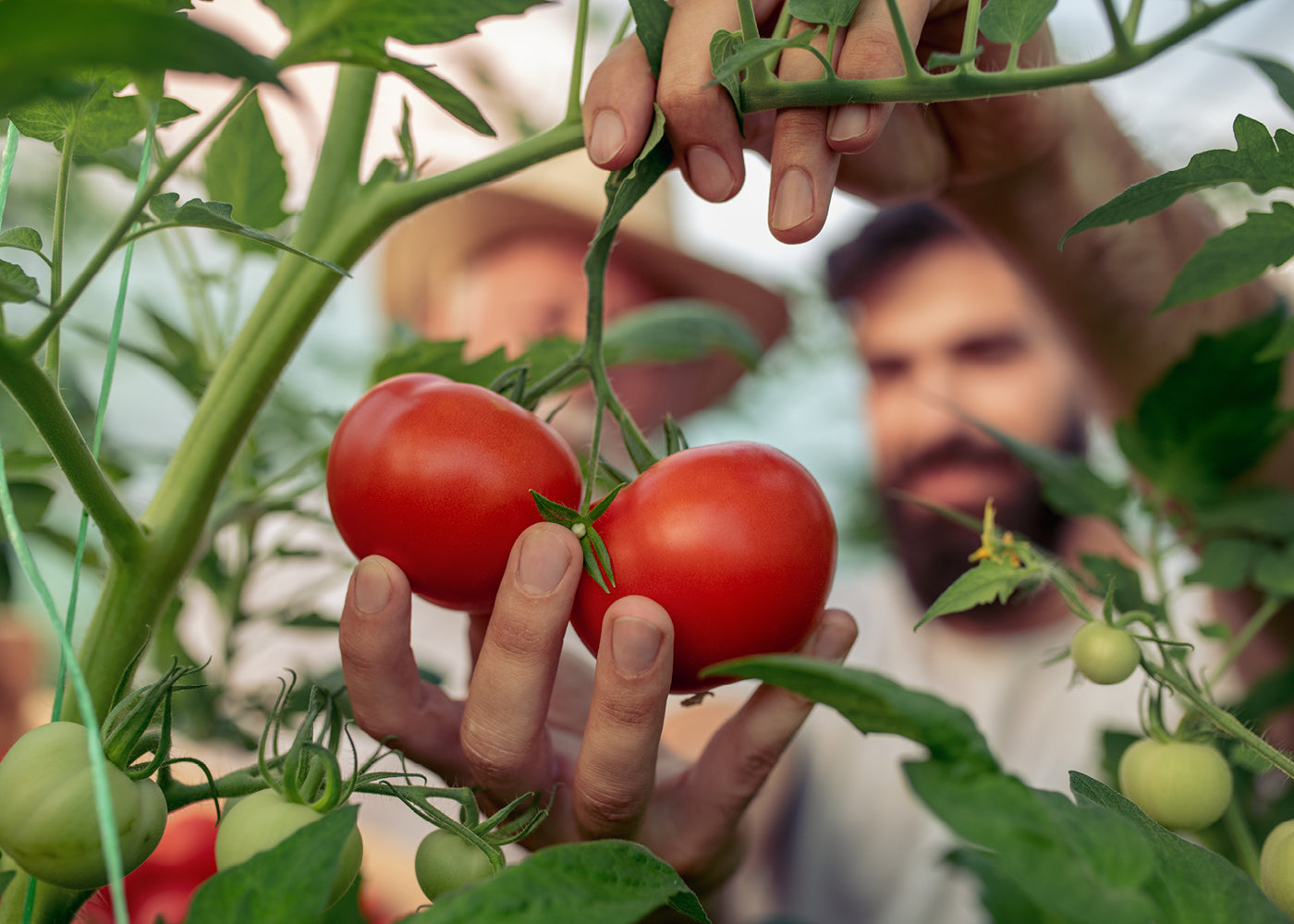Prostate health is a significant concern for many men, particularly as they age. The prostate, a small gland that produces seminal fluid in males, transforms significantly throughout life. In particular, it is known to enlarge as men age, leading to concerns around sexual function, urination, and overall pelvic comfort. While there is no surefire way to prevent these issues, various lifestyle and dietary modifications can help support natural prostate health and beyond this, improve overall wellness, sexual function, and urinary comfort.
Healthy Eating
Diet plays a vital role in supporting prostate health. A diet high in fruits, vegetables, and lean proteins can help maintain a healthy prostate. Vegetables like broccoli, cabbage, and cauliflower contain compounds called glucosinolates that are known to be powerful antioxidants.1 Lycopene, a powerful antioxidant found in produce with a reddish-pink pigment such as tomatoes, is receiving attention for its potential role in supporting the prostate.2 Though research is ongoing, several observational studies have indicated that a diet high in lycopene could be associated with the long-term maintenance of a healthy prostate and its functions.3
Another solid choice is consuming foods rich in Omega-3 fatty acids, like salmon, mackerel, and trout. Seaweed, edamame, and ground flax seeds are among several other plant-based omega-3s. This polyunsaturated fat is known for having a plethora of health benefits including supporting healthy lipid levels, improving joint comfort, and helping stay sharp cognitively.4 Moreover, limiting intake of red meat, processed foods, and high-fat dairy products can help support prostate health as well as all aspects of human health. Eating too much of these foods can lead to obesity, which is a risk factor increasing the incidence of prostate problems, not to mention the impacts on the cardiovascular system. Lastly, moderation in alcohol consumption is also advised as is smoking cessation.
Staying Hydrated
Similar to cleaning up the diet, drinking plenty of fluids can help maintain a healthy urinary system. Water flushes out toxins from your body, supporting your overall health. However, excessive water intake can cause frequent urination, which may irritate the prostate. So, balance is the key.
Zinc and Prostate Health
Zinc is an essential mineral that plays a crucial role in cellular metabolism, immune function, and oxidative stress control. Some studies have found lower concentrations of zinc in the prostate tissue and urine of men with benign prostatic hyperplasia. Although more research is needed, it appears that maintaining a healthy level of zinc might be beneficial for prostate health.5 Some examples of high zinc containing foods include oysters, red meat, legumes, dairy, whole grains, eggs, and even dark chocolate!
Physical Activity
Regular physical activity can support overall health, including prostate health. Moderate exercise, such as brisk walking, swimming, or biking for at least 30 minutes a day, can help maintain a healthy weight and boost the immune system.6
Prostates and Pressure: How Stress Impacts the Prostate
Chronic stress can impact our overall health, and the prostate is no exception. Techniques like meditation, deep breathing, yoga, and other relaxation methods can help manage stress levels.7 Getting sufficient sleep is also crucial for maintaining a healthy immune system and cellular regeneration, both of which are important for prostate health.
Ejaculation and Prostate Health
Regular sexual activity has been hypothesized to flush out potential carcinogens in the prostate. A study published in JAMA found that men who ejaculated 21 times or more each month were less likely to get prostate cancer compared to those who ejaculated 4-7 times a month.8
Plants and Prostates
Plants have been used for millennia to promote healthy male sexual function, support the urinary tract, and improve overall pelvic function. Today, there are some herbs that are better known for their prostate-supportive qualities. And the winners are:
-
Saw Palmetto: An extract from the berries of the saw palmetto plant, it has been widely used in Europe for benign prostatic hyperplasia. Multiple studies suggest it can help reduce urinary symptoms linked to prostate enlargement.9
-
Pygeum: An extract derived from the bark of the African plum tree, pygeum has shown potential for supporting all aspects of prostate health and sexual function.10 It is also notable for the fact that many studies utilize 50mg or less, making a little bit go a long way.
-
Stinging Nettle: This plant's root is used in medicine and is often combined with saw palmetto and with good reason. It is understood to support the body’s antioxidant system by promoting healthy levels of superoxide dismutase. It has been studied clinically for supporting urinary comfort as well.11
-
Pumpkin Seeds: They contain beta-sitosterol, a phytosterol associated with improved urinary flow and better urinary health in men similar to Saw Palmetto. They are also a nutritious food that is high in zinc. Several well-designed trials have seen modest improvement in urinary function as well.12
-
Tribulus: Tribulus has been studied for its usefulness in supporting sexual function in men as well as improving urinary comfort. There was also a modest increase in testosterone levels in test subjects.13
-
Green Tea: Emerging research is highlighting the potential benefits of green tea for prostate health. Green tea is rich in polyphenols, particularly catechins, which exhibit strong antioxidant properties. One study found that men who consumed seven or more cups of green tea per day had significantly improved prostate health.14
The Soy Connection
Isoflavones, compounds found in soy products, may contribute to lower incidences of prostate cancer, as observed in Asian populations.17 However, the exact mechanism isn't fully understood but it's speculated that isoflavones may work as antioxidants and modulate hormone regulation. In the case of prostate health, the metabolite of testosterone known as dihydrotestosterone, which is responsible for prostate growth, is inhibited by isoflavones.15
Curcumin: The Golden Compound
Curcumin, the active compound in turmeric, has been studied for its potential protective effects on prostate health. Its antioxidant and immune supportive properties are well-established and human trials show that curcumin can play a role in supporting pelvic comfort and prostate health.16
The Verdict
While these natural approaches can offer a holistic and multi-faceted method to support prostate health, it's essential to remember that they should complement, not replace, traditional medical treatments when needed. Further, research in this field is ongoing, and while many studies show promising results, more rigorous, large-scale trials are needed for definitive conclusions.
These natural approaches provide an array of ways to support prostate health. From dietary changes, and lifestyle modifications, to the use of specific herbs and natural compounds, these methods can offer a comprehensive approach to prostate health.
__________
References
- Kristal, A. R., & Lampe, J. W. (2002). Brassica vegetables and prostate cancer risk: a review of the epidemiological evidence. Nutrition and cancer, 42(1), 1–9.
- Beynon, R. A., Richmond, R. C., Santos Ferreira, D. L., Ness, A. R., May, M., Smith, G. D., Vincent, E. E., Adams, C., Ala-Korpela, M., Würtz, P., Soidinsalo, S., Metcalfe, C., Donovan, J. L., Lane, A. J., Martin, R. M., ProtecT Study Group, & PRACTICAL consortium (2019). Investigating the effects of lycopene and green tea on the metabolome of men at risk of prostate cancer: The ProDiet randomised controlled trial. International journal of cancer, 144(8), 1918–1928.
- Chen, J., Song, Y., & Zhang, L. (2013). Lycopene/tomato consumption and the risk of prostate cancer: a systematic review and meta-analysis of prospective studies. Journal of nutritional science and vitaminology, 59(3), 213–223.
- Swanson, D., Block, R., & Mousa, S. A. (2012). Omega-3 fatty acids EPA and DHA: health benefits throughout life. Advances in nutrition (Bethesda, Md.), 3(1), 1–7.
- Zhao, J., Wu, Q., Hu, X., Dong, X., Wang, L., Liu, Q., Long, Z., & Li, L. (2016). Comparative study of serum zinc concentrations in benign and malignant prostate disease: A Systematic Review and Meta-Analysis. Scientific reports, 6, 25778.
- Kang, D. W., Fairey, A. S., Boulé, N. G., Field, C. J., Wharton, S. A., & Courneya, K. S. (2022). A Randomized Trial of the Effects of Exercise on Anxiety, Fear of Cancer Progression and Quality of Life in Prostate Cancer Patients on Active Surveillance. The Journal of urology, 207(4), 814–822.
- Kaushik, D., Shah, P. K., Mukherjee, N., Ji, N., Dursun, F., Kumar, A. P., Thompson, I. M., Jr, Mansour, A. M., Jha, R., Yang, X., Wang, H., Darby, N., Ricardo Rivero, J., Svatek, R. S., & Liss, M. A. (2022). Effects of yoga in men with prostate cancer on quality of life and immune response: a pilot randomized controlled trial. Prostate cancer and prostatic diseases, 25(3), 531–538.
- Leitzmann MF, Platz EA, Stampfer MJ, Willett WC, Giovannucci E. Ejaculation Frequency and Subsequent Risk of Prostate Cancer. JAMA. 2004;291(13):1578–1586.
- Gerber, G. S., Zagaja, G. P., Bales, G. T., Chodak, G. W., & Contreras, B. A. (1998). Saw palmetto (Serenoa repens) in men with lower urinary tract symptoms: effects on urodynamic parameters and voiding symptoms. Urology, 51(6), 1003–1007.
- Chatelain, C., Autet, W., & Brackman, F. (1999). Comparison of once and twice daily dosage forms of Pygeum africanum extract in patients with benign prostatic hyperplasia: a randomized, double-blind study, with long-term open label extension. Urology, 54(3), 473–478.
- Akbar Karami, A., Sheikhsoleimani, M., Reza Memarzadeh, M., Haddadi, E., Bakhshpour, M., Mohammadi, N., & Mehdi Mirhashemi, S. (2020). Urtica Dioica Root Extract on Clinical and Biochemical Parameters in Patients with Benign Prostatic Hyperplasia, Randomized Controlled Trial. Pakistan journal of biological sciences : PJBS, 23(10), 1338–1344.
- Vahlensieck, W., Theurer, C., Pfitzer, E., Patz, B., Banik, N., & Engelmann, U. (2015). Effects of pumpkin seed in men with lower urinary tract symptoms due to benign prostatic hyperplasia in the one-year, randomized, placebo-controlled GRANU study. Urologia internationalis, 94(3), 286–295.
- GamalEl Din, S. F., Abdel Salam, M. A., Mohamed, M. S., Ahmed, A. R., Motawaa, A. T., Saadeldin, O. A., & Elnabarway, R. R. (2019). Tribulus terrestris versus placebo in the treatment of erectile dysfunction and lower urinary tract symptoms in patients with late-onset hypogonadism: A placebo-controlled study. Urologia, 86(2), 74–78.
- Guo, Y., Zhi, F., Chen, P., Zhao, K., Xiang, H., Mao, Q., Wang, X., & Zhang, X. (2017). Green tea and the risk of prostate cancer: A systematic review and meta-analysis. Medicine, 96(13), e6426.
- Dillingham, B. L., McVeigh, B. L., Lampe, J. W., & Duncan, A. M. (2005). Soy protein isolates of varying isoflavone content exert minor effects on serum reproductive hormones in healthy young men. The Journal of nutrition, 135(3), 584–591.
- Morgia, G., Russo, G. I., Urzì, D., Privitera, S., Castelli, T., Favilla, V., & Cimino, S. (2017). A phase II, randomized, single-blinded, placebo-controlled clinical trial on the efficacy of Curcumina and Calendula suppositories for the treatment of patients with chronic prostatitis/chronic pelvic pain syndrome type III. Archivio italiano di urologia, andrologia : organo ufficiale [di] Societa italiana di ecografia urologica e nefrologica, 89(2), 110–113.
- Yan, L., & Spitznagel, E. L. (2009). Soy consumption and prostate cancer risk in men: a revisit of a meta-analysis. The American journal of clinical nutrition, 89(4), 1155–1163.

